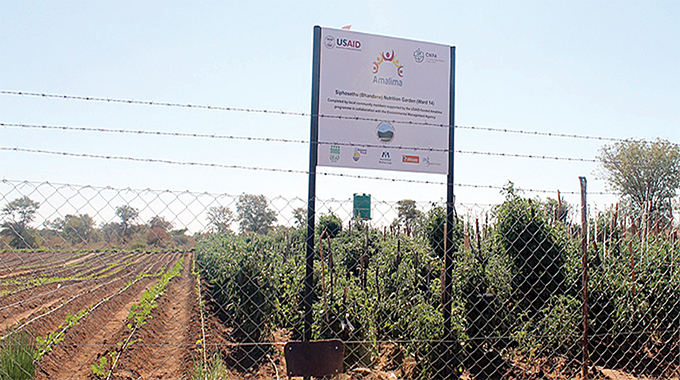Solar garden changes lives in rural Gwanda

Sukulwenkosi Dube-Matutu, Gwanda Correspondent
ABOUT 25 households from Sengenzane Village in Ward 14 Gwanda District have benefited from a solar-powered garden that was established under the Amalima Programme in their ward.
Amalima is a USAid-funded programme being implemented in Matabeleland North and Matabeleland South provinces by a consortium of non-governmental organisations.
Speaking during an Amalima Day celebration held recently in the village, the chairperson of the project, Mrs Esther Maseko said the garden had become a source of livelihood.
She said they were selling their products to local schools and the community.
“Siphosethu Garden has brought huge relief to us as a village as it has become a source of livelihood to us and our families. We have 24 households that are farming in this garden. We have supplied our products to a number of schools locally and we also sell our products to locals.
“The products that we normally grow in this garden include butternuts, maize, tomatoes, water melons, sweet potatoes, onions and choumolier.
Before we sell our products we make inquiries on the pricing trends then we peg our prices a bit lower so we can cater for the rural folk. The money that we realise after selling our products is the money we use to pay school fees for our children and put food on the table. This project has really proven to be a reliable source of income,” she said.
Mrs Maseko said they were still looking for more markets where they could sell their products in bulk. She said Amalima assisted them with resources to build the garden while villagers provided labour. She said other stakeholders also assisted in the project.
Mrs Maseko said Amalima and Agritex facilitated the training of the villagers in preparation of the project. She said the garden gets its water from Tuli River.
“There is a pipe line which draws water from Tuli River into a tank in the garden. The water is then drawn from the tank to the crops through a drip system,” she said.
Speaking during the ceremony Amalima Agriculture and Livelihoods Manager, Mr Nicholas Nyathi said the project was one of the community-driven projects which the organisation was implementing in various districts in the province.
“Amalima programme started sometime in 2013 and it is focusing on crop and livestock production as well as improving the resilience of communities and nutrition. We focus on empowering people so that they may produce and feed their families. We have trained a number of people on crop production, water conservation agriculture, we have also trained more that 30 000 people from various districts on livestock management,” he said.
“We have also done a lot in rehabilitating dip tanks, rehabilitating dams and constructing new ones. We have also constructed irrigation schemes that have improved technology such as solarised water systems. All these projects are meant to improve food security.”
—@DubeMatutu








Comments